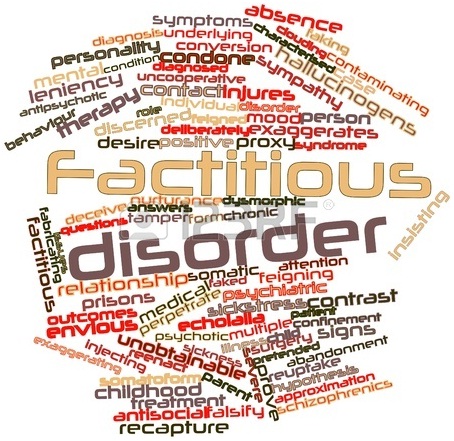Factitious Disorder Causes, Symptoms, Diagnosis and Treatment

What Is Factitious Disorder?
Factitious disorder is a mental condition in which a person acts as if he/she has an illness. The affected individual deliberately produces, feigns, or exaggerates symptoms in order to come off as sick.
Such a behavior either may be exhibited at all times, or in front of a particular individual. People with this condition may produce symptoms by contaminating urine samples, taking hallucinogens, injecting themselves with fecal material to produce an abscess, and other similar behavior.
Factitious disorder symptoms vary in severity. They can range from being mild to severe. In case of severe factitious disorder the person may make up symptoms or even tamper with medical tests to convince others that treatment is needed.
Being a psychological disorder, factitious disorder is hard to treat. However, treatment is necessary to prevent self harm.
Causes Of Factitious Disorder:
The cause of factitious disorder is not known. However, research is ongoing in this domain.
It is thought that people with this disorder may have experienced a severe illness when they were young or may have been emotionally or physically abused.
A number of factors may increase the risk of developing factitious disorder. They may include:
- Experiencing childhood trauma
- Having a serious illness during childhood
- Having a relative with a serious illness
- Having a poor sense of identity or self-esteem
- Losing a loved one early in life
- Having personality disorder
Symptoms Of Factitious Disorder:
Signs and symptoms exhibited may include:
- Complaining of having medical problems
- Frequent hospitalizations
- Vague or inconsistent symptoms
- Conditions that get worse for no apparent reason
- Conditions that don’t respond as expected to standard therapies
- Eagerness to have frequent testing or risky operations
- Extensive knowledge of medical terms and diseases
- Seeking treatment from many different doctors or hospitals
- Having few visitors when hospitalized- a sign that such hospitalizations are high in frequency
- Reluctance to allow health professionals to talk to family or friends or to other health care providers
- Frequent requests for pain relievers or other medications
Diagnosis Of Factitious Disorder:
The following diagnostic criteria must be met for an individual to be diagnosed with factitious disorder:
- Making up physical or psychological signs or symptoms or causing injury or disease with the deliberate intention to deceive
- Continuing with the deception, even without receiving any visible benefit or reward
- Behavior is not better explained by another mental disorder, such as a delusional disorder or another psychotic disorder
Treatment Of Factitious Disorder:
There are no standard therapies directed to tackle factitious disorder. This makes treatment hard.
However, treatment is necessary to prevent an individual from inflicting self-harm.
Treatment generally includes talk therapy (psychotherapy) and behavior counseling. Moreover, Selective serotonin reuptake inhibitors (SSRIs) can help manage underlying problems. Medicines such as SSRIs that are used to treat mood disorders can be used to treat FD, as a mood disorder may be the underlying cause of FD.
By : Natural Health News




